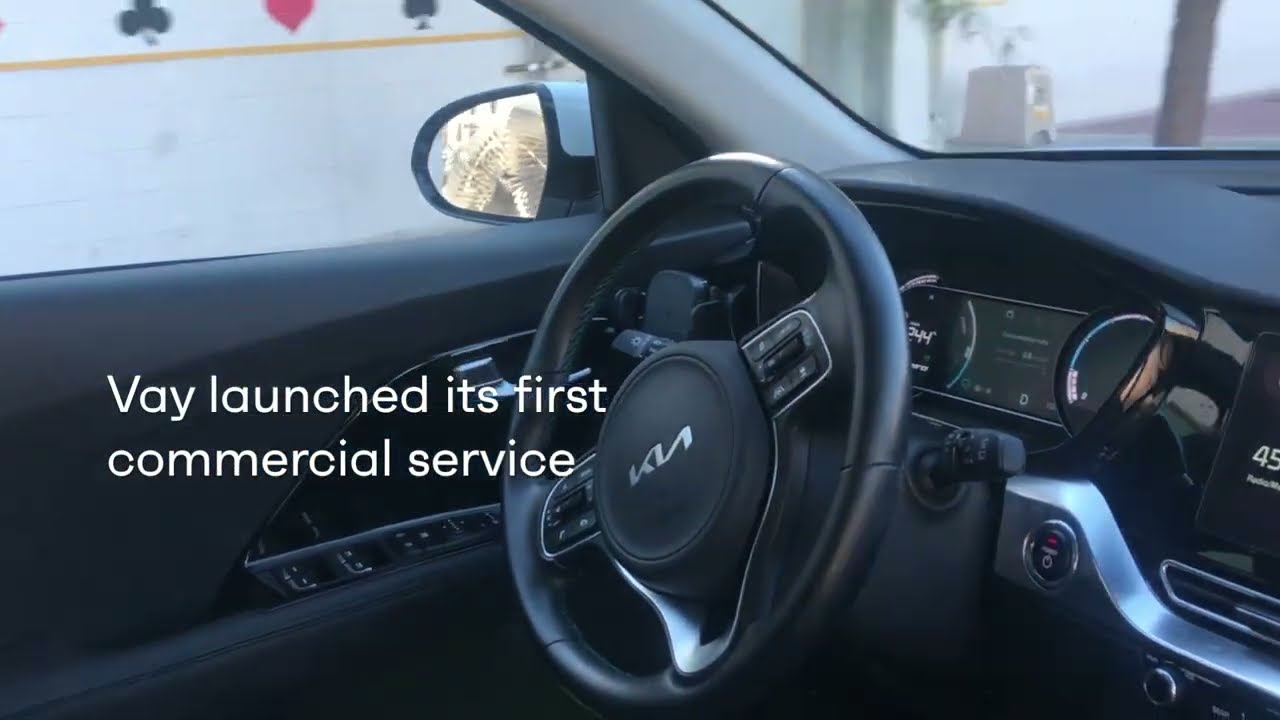- Vay’s new rental cars are remotely delivered by teledrivers
- Drivers sit at stations with a steering wheel and live video feeds
- A trial is running in Las Vegas via an iOS app ahead of a European launch
Next time you rent a car, it could be delivered by a driver sitting miles away. Vay, a car rental service, is trialing a technology in Las Vegas where its vehicles are ferried to customers by remote teledrivers – and the tech could be coming to Europe soon, too.
Using the Vay app, you can summon a vehicle to rent by the minute. Drop a pin and your car will arrive driverless, ready for you to use for as long as you need. The system isn’t reliant on self-driving technology, though: Vay’s fleet is operated from afar by a team of professional teledrivers. When you’re done, they can even park for you.
These trained operators sit at stations similar to racing simulators. They drive the vehicle remotely using a steering wheel, pedals and other controls which, according to Vay, have been “developed to meet automotive industry standards.”
Teledrivers watch a live video feed of the road on a bank of monitors, fed in real-time from camera sensors installed in the vehicle. Microphones on the car also relay traffic sounds and warning signals to the teledriver’s headphones.
According to Vay, the system is reliant on “multiple cellular networks combined with proprietary hardware on both telestation and the vehicle.”
Before getting behind the wheel of a real remote-control car, Vay’s drivers are put through its Teledrive Academy. Vay describes this as, “a rigorous program that prepares our drivers for public streets.”
Vay is also bullish about its safety standards. It called in TÜV Süd, an independent testing and certification body, to confirm that its remote-driving technology is indeed safe. As robust as its data relays are, there are also safeguards built in: in an emergency, the vehicle automatically comes to a safe stop. According to Vay, the teledrive system is “as safe as having someone in the driver’s seat”.
It isn’t the only company working on teledriving tech. The Estonian startup Elmo was recently given approval in its home country for its AI-powered autonomous braking system, which lets cars driver at higher speeds without a human driver. But not all of Vay’s rivals are ready to ditch the human driver just yet…
Ghost rider

Vay’s ambition is to roll out driverless mobility services which combine the best bits of humans and machines, with the net benefit of reducing the number of cars in cities.
Going forward, it intends to incorporate more autonomous functions into the system, once they are safe and legal. For now, its trial fleet is operating in Las Vegas. But momentum from recent fund-raising and new partnerships with the likes of Belgian car-sharing platform Poppy mean similar trials in Europe are now on the horizon.
Vay isn’t the only firm trialing variations on the robotaxi concept. Alphabet subsidiary Waymo has been running its driverless taxis in Los Angeles, while Hyundai has been operating a highly autonomous version of the Ioniq 5 in partnership with Uber – albeit with a human driver behind the wheel as a backup.
Elon Musk also finally unveiled Tesla’s long-promised “Cybercab” in October, although very few details were revealed about the technology powering the vehicle. A recent job listing for a remote teleoperator indicates that Tesla could be following Vay’s lead with its robot taxis.
According to the listing, “Tesla AI’s Teleoperation team is charged with providing remote access to our robotaxis and humanoid robots. Our cars and robots operate autonomously in challenging environments. As we iterate on the AI that powers them, we need the ability to access and control them remotely.”
Unlike Vay, the job description suggests that Tesla’s remote driving system will rely on VR rather than video screens. “Our remote operators are transported into the device’s world using a state-of-the-art VR rig that allows them to remotely perform complex and intricate tasks.”
Time will tell when, where and whether at all Tesla rolls out its tele-operated taxis. For the time being, if you want to have a rental car delivered by a remote driver you’ll need to hit up Vay in Las Vegas. The app is available for iOS now. If you’re an Android user, you can join the waitlist.
You might also like…
Services Marketplace – Listings, Bookings & Reviews
